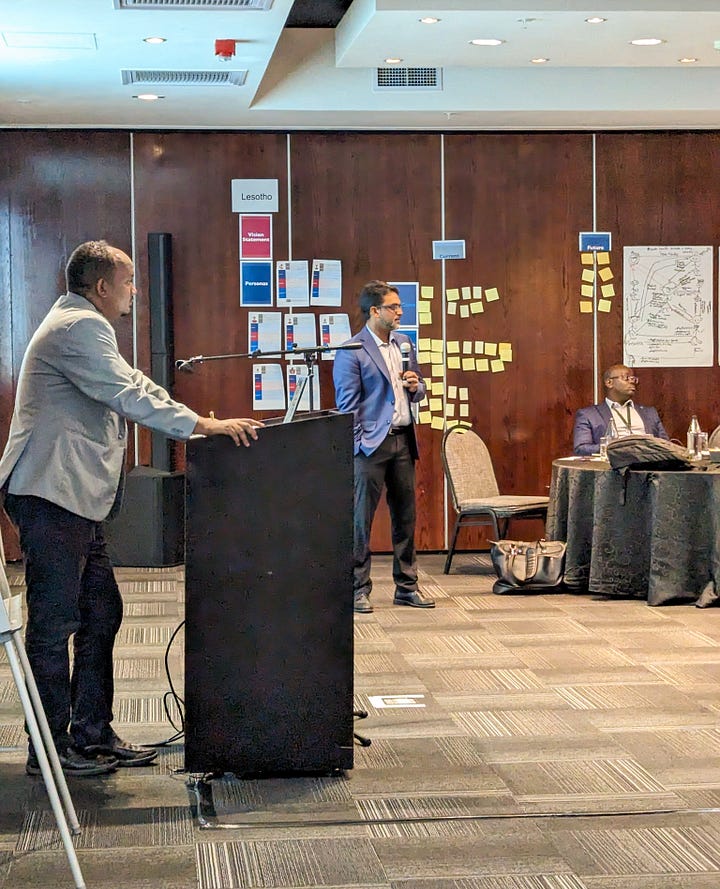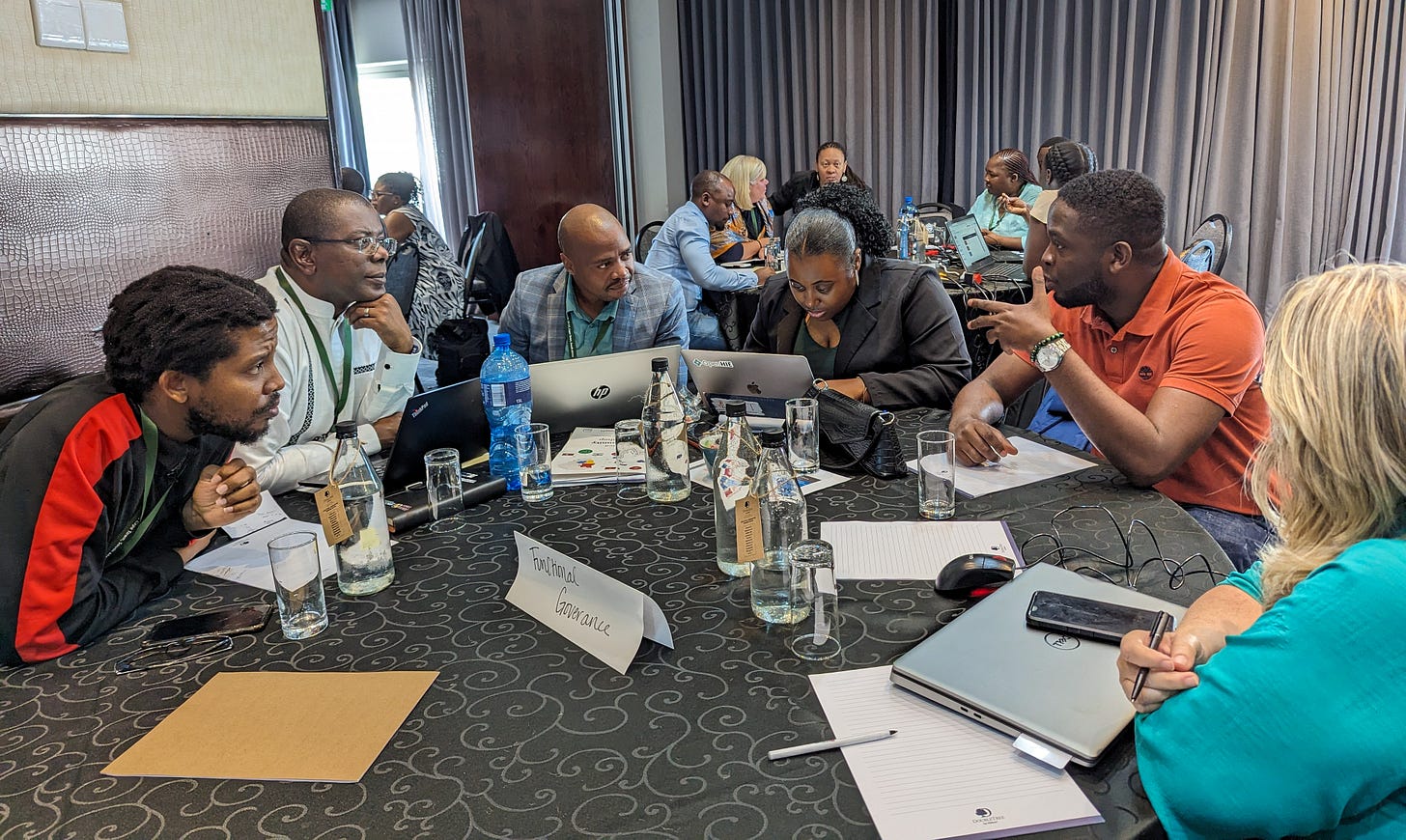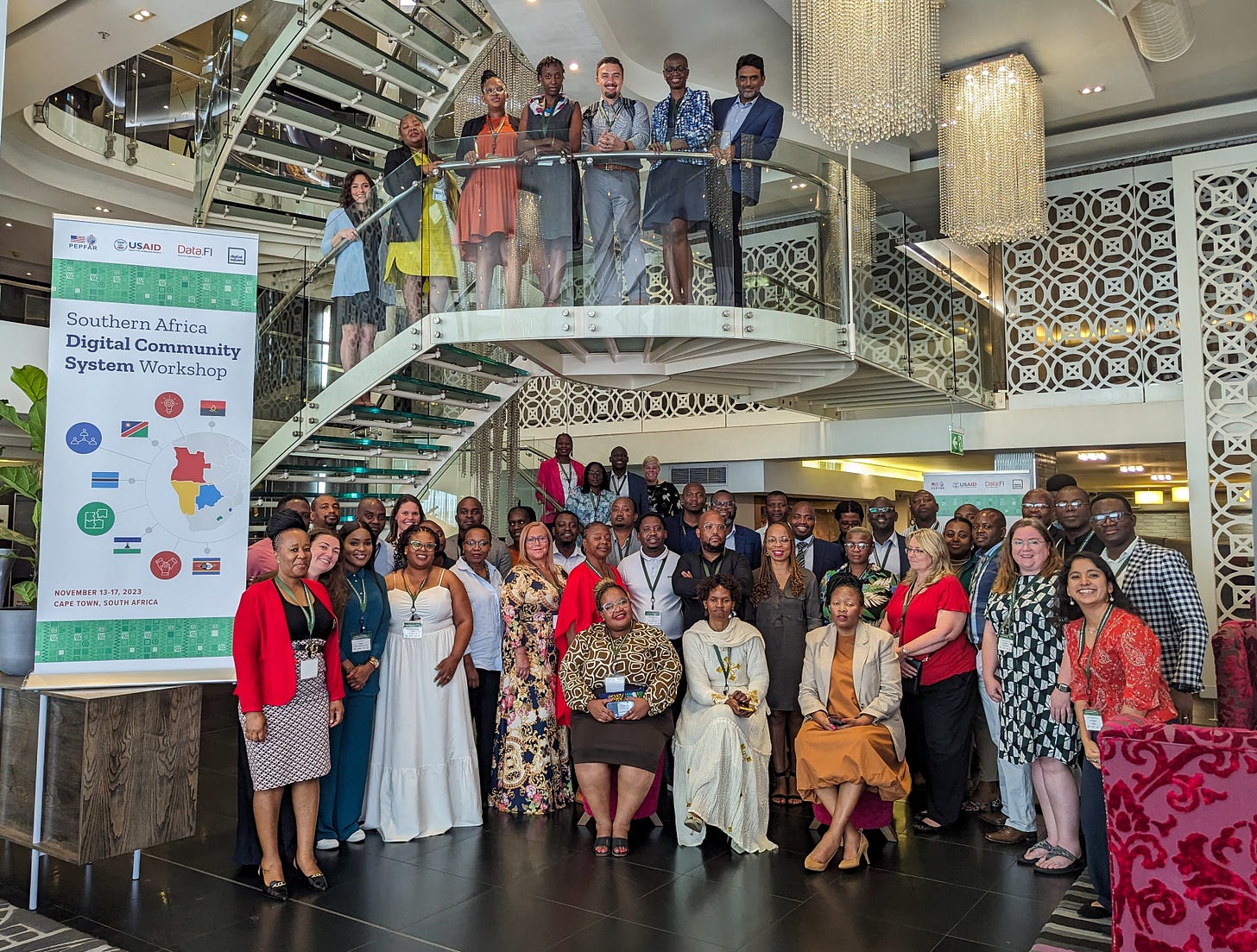Unlocking the Potential of Digital Community Systems: Insights from the Southern Africa Regional Workshop
By Netsanet Nigussie (Data.FI), Amarynth Sichel, Joy Kamunyori, and Sriyanjit Perera (USAID)
What might community service provision look like, if it was facilitated by a digital tool designed to center people and support integrated services? This was the question that representatives from five Southern African countries (Angola, Botswana, Eswatini, Lesotho, and Namibia), came together to address in November 2023 in Cape Town, South Africa. Through a five-day technical workshop co-hosted by the Data for Implementation (Data.FI) project and Digital Square, and supported by the United States Agency for International Development (USAID), government leaders and key stakeholders developed visions and roadmaps for digital community systems, charting the course to strengthen community service delivery through digital transformation.
The Digital Community Systems Workshop Approach: The workshop was designed to shift status quo approaches in two ways:
Digital systems supporting people to deliver services: the workshop encouraged all participants to think about how digital community systems—i.e., digital systems operated by and for individuals at the subnational, local community level—can best support service providers and clients, with data collection for reporting occurring as a side-effect of strong support in the service provision interaction.
Integration, not just across health program areas, but across sectors: the workshop focused on services delivered at the community level, which includes health services and some social services, such as support for young people.
The attendees included government officials from ministries of health and ministries overseeing other community-level social services (e.g., social development, local government), as well as development partners and implementing partners that focus on digital health and community services. The agenda was carefully planned and refined each day, with optional deep dive sessions starting as early as 7:30 am, to meet the wishes of participants. Discussion and brainstorming were organized around several core themes, including the needs of all stakeholders engaged in community services, effective approaches to using technology to meet these needs, governance structures, and measures for defining and monitoring success. By convening a large group of thought leaders and decision makers around these topics, we hoped to spark and empower participants to lead and propagate a major shift in how community-level digital systems are planned, developed and used in Southern Africa.
Client- and Community Worker-centric Systems: The workshop focused on empowering countries to build systems that prioritize the needs of system users, i.e., clients and community service providers, including health workers; and that integrate services across various focus areas. To help illustrate these concepts, the workshop introduced the concept of the 'User Universe,' presenting fictitious characters, or personas, and scenarios to illustrate how a person-centered and integrated digital community system can improve workflows for community health workers (CHWs) and social workers and improve service delivery to clients. For example, we introduced the character Zuri, who is a CHW, showing what her day looks like currently (Figure 1), and exploring how a user-centered digital tool might help her throughout the day (Figure 2).

Bridging the Gap: Operationalizing Ideas into Technical Realities through Interoperability and Architecture: The workshop also sought to create a shared understanding of the technical requirements for implementing person-centered, integrated systems, such as interoperability and technical architecture. Technical sessions illustrated for participants how adopting shared interoperability standards, leveraging shared services, and exploring global goods can help them to navigate the complexities of the digital community systems landscape, and foster seamless communication and efficient data exchange. Early morning learning sessions were also conducted on various cutting-edge topics, such as machine learning applications, smart guidelines, and costing national digital health strategies.
Strengthening Digital Health Governance: Participation from decision-makers from a diverse range of government ministries highlighted how crucial governance and coordination structures are for digital community systems. Participants outlined current governance structures, digital health strategies, and key legal and policy considerations, and explored what changes might be needed in the future to support their vision for integrated digital community systems.
Adaptive management, continuous monitoring, and learning: The workshop explored how different stakeholders define success, monitor progress, and use data for adaptive management. Defining and measuring success for using a digital tool sometimes required participants to shift the way they track progress. For example, in some countries, current methods for measuring data quality involve comparing different paper records. How might changes in data quality be measured, however, if there are no paper records to compare against? How do we define key measures of progress to ensure that our focus is on service delivery improvement, that targets are appropriately focused on health outcomes, and that achievements resonate with decision makers?
Through this learning track, participants explored how best to conduct indicator mapping and build monitoring and evaluation frameworks that are measurable and relevant for digital community systems. In doing so, participants grappled with questions such as how do we ensure monitoring frameworks are easy to implement, produce real feedback and do not become a project on their own. Discussion in this part of the workshop underlined the importance of defining simple indicators aligned with outputs, and the critical role of real-time data and analytics for upline managers.
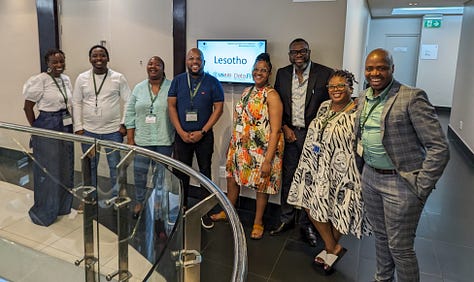

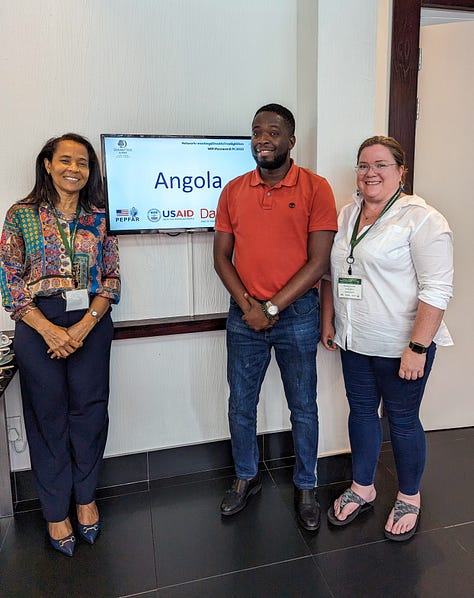


Key workshop approaches: Several tactics helped ensure that, despite the long hours, the workshop remained engaging. These included:
Cross-country learning: One of the key objectives of the workshop was to facilitate cross-country learning. Case studies from Ethiopia and Tanzania offered insights into the challenges, achievements, and lessons from designing and implementing digital community systems. Workshop participants shared their own experiences, fostering cross-border learning.
Wall time: to support active engagement and collaboration, country groups gathered daily to collaboratively map the path towards digitally transformed community service delivery. Through "wall time" each country team was offered a dedicated wall space and tools like sticky notes, print outs, markers and stickers to work on specific exercises and group activities. Countries posted and presented the outputs of their discussion and group work on their walls.
Greenhouse: A dedicated place, or a “greenhouse,” was created for participants to post their unresolved questions, concerns, or inquiries, ensuring that every participant had a voice throughout the week. The workshop featured dedicated time to address these questions, which covered a range of topics, from tablet capabilities to program improvement strategies.
Visual Aids: Each country was provided with a set of visual tools, icons, and templates that built on the key planning concepts and helped country teams prepare visually appealing presentations to convey their own new ideas. Overnight, graphical teams in another time zone reviewed country teamwork, prepared new visual aids and cleaned up presentations.
Conclusions and Looking Forward: Roadmaps, Partnerships, and Funding Strategies: As the week progressed, the focus shifted towards supporting country team to develop roadmap presentations for community digital systems implementation. By developing these presentations, country teams had tools to use when they returned home to advocate for new digital tools that focus on people and service delivery. These roadmaps will serve as guiding documents for each of the participant countries, providing a clear vision and articulating needs for future initiatives.
The Southern African Digital Community System Regional Workshop was a major success. It was an exciting and invigorating week, with strong engagement from participants. As one participant put it, “Work that would have taken months to complete was successfully achieved in one week.” However, this is only the start of a collaborative and transformative digital community systems journey in the region. USAID and its implementing partners are initiating new investments to support the evolution of community digital systems, are committed to aligning with country national strategies and are eager to collaborate with other funding and implementing partners to support countries’ evolving community services visions.
As countries continue to navigate the challenges and opportunities presented by digital community systems, we must continue to emphasize people-centered and locally led solutions. If we harness technology with these principles at the forefront, we can build more responsive, comprehensive, and sustainable community-level services.
